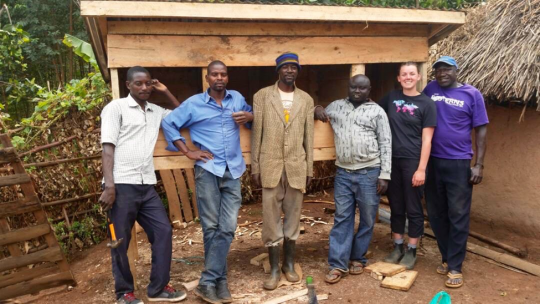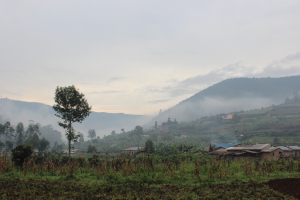
Tucked away in the corner of Southwestern Uganda, bordering Rwanda, lies Kabale district. Unlike the traditional dry, barren, desert-centered images of sub-Saharan Africa, Kabale is lush, green, and mountainous. Known to locals and tourists alike as the “Switzerland of Africa”, Kabale’s terraced hills are dotted with agriculture plots, eucalyptus trees, and subsistence crops like Irish potatoes, bananas, pumpkin, beans and corn. I’ve been lucky enough to live in Kabale-town (the main town in the district) for 9 weeks now.
Although Kabale district is the largest agricultural producing area in Uganda, it also has one of the highest rates of malnutrition in the country. Seems like a contradiction, right? The organization I’m interning with, Kigezi Healthcare Foundation, or better known as KIHEFO, is a community-based health clinic working to fight malnutrition in the district. KIHEFO was founded by Dr. Geoffrey Anguyo (known to locals and interns as Dr. G) who recognized the issues of malnutrition and decided to do something about it. Dr. G’s passion for fighting malnutrition in a sustainable, integrated, and innovative way is contagious. After 17 years, KIHEFO has 5 clinics in Kabale-town, which focus on HIV, general health, dental health, nutrition rehabilitation, and maternal health and holds 7 outreaches each month is rural communities. These outreaches, which can be anywhere from thirty minutes to two hours outside of Kabale-town, aim to bring medical services and health education to people who otherwise would never receive medical attention or education.
KIHEFO also has a rabbit breeding program, which helps people living in rural communities generate income and have a consistent source of protein. Since the program was founded in 2013, over 100 families in rural communities have received rabbits to breed, sell, and eat. When KIHEFO donates  rabbits to a family for free, the require the family to give away one of the rabbits from their first litter to another family in need in their community. That family is then required to donate one of the rabbits from their first litter, and so on. This model sustainably spreads rabbit breeding throughout a community without extensive involvement from KIHEFO. KIHEFO chose rabbits to breed because they require little inputs (they will eat any type of weeds), have a short gestation period, are a highly nutritious (they contain high levels of protein and low levels of fat), and their droppings and urine can be used as fertilizer and pesticide. When I arrived in Kabale, and learned about this program, I was inspired by this project and how it promotes food security and alleviates poverty and malnutrition. I asked Dr. G how to get more involved, and he said if I could raise $150, I could help build a rabbit hutch and donate rabbits to a family in need in a community. After a generous donation from my dad, we got working on identifying a family to donate to and constructing a hutch.
rabbits to a family for free, the require the family to give away one of the rabbits from their first litter to another family in need in their community. That family is then required to donate one of the rabbits from their first litter, and so on. This model sustainably spreads rabbit breeding throughout a community without extensive involvement from KIHEFO. KIHEFO chose rabbits to breed because they require little inputs (they will eat any type of weeds), have a short gestation period, are a highly nutritious (they contain high levels of protein and low levels of fat), and their droppings and urine can be used as fertilizer and pesticide. When I arrived in Kabale, and learned about this program, I was inspired by this project and how it promotes food security and alleviates poverty and malnutrition. I asked Dr. G how to get more involved, and he said if I could raise $150, I could help build a rabbit hutch and donate rabbits to a family in need in a community. After a generous donation from my dad, we got working on identifying a family to donate to and constructing a hutch.
We found a family about a thirty minute drive outside of Kabale-town who was in need of the financial and nutritious assistance. We visited them at their simple, three-roomed mud hut, and were touched by the father’s kind, reserved demeanor, and decided they would be good beneficiaries. Both parents are HIV positive, although their five kids, thankfully, are negative. However, their two youngest kids (a pair of twins) have bowed legs and feet and can’t walk. It took us two full days to build the rabbit hutch. While we were there, we helped build, played with the children, and chatted. The family cooked us a delicious, and probably expensive, lunch of beans, sweet potatoes, and posho (a type of bland cornbread). When it rained, we all took cover in their home. Our time building the hutch stands out as some of my fondest memories in Kabale. I’ll never forget the look of excitement and gratitude the family gave me when we handed them the rabbits. I’m proud that I was able to make a difference in a family’s life and in their greater community while I was here. I hope to see KIHEFO’s rabbit breeding program grow to the point where every family in Kabale rears rabbits.